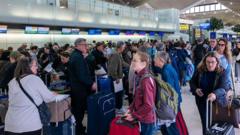Air traffic operations at Newark Liberty International Airport took a troubling turn last week when controllers reported a brief but critical loss of communication with planes. According to a spokesperson from the local air traffic controllers' union, this breakdown left controllers "unable to see, hear, or talk to" the incoming and outgoing aircraft.
The incident, which occurred on April 28, triggered an overwhelming response from the airport's staff, leading multiple employees to enter trauma leave. Consequently, Newark has seen hundreds of flights either delayed or diverted, significantly affecting travelers. Flight tracking service FlightAware noted over 150 cancellations at the airport just on Monday.
As Newark serves as a vital hub for the New York metropolitan area, its operations have been hampered by ongoing staffing shortages, exacerbated by this recent incident. The Federal Aviation Administration (FAA) has responded, acknowledging that "our antiquated air traffic control system is affecting our workforce," as controllers struggle to manage the volume of air traffic safely.
In their statement, the FAA confirmed the trauma leave taken by some controllers and admitted that replacements cannot be swiftly deployed. "We continue to train controllers who will eventually be assigned to this busy airspace," the FAA outlined, adding that the agency is taking measures to ramp up hiring efforts.
United Airlines has also been vocal about the operational challenges at Newark, announcing the cancellation of 35 flights daily due to the airport's inability to accommodate the necessary air traffic. United CEO Scott Kirby highlighted the situation, explaining how failures in essential air traffic control technology had led to frequent diversions and delays.
The National Air Traffic Controllers Association (NATCA) reported that the affected employees were granted leave under a policy for coping with traumatic workplace events. However, the exact number of controllers who have taken this leave remains undisclosed.
In light of these challenges, the US Department of Transportation recently introduced a hiring package aimed at increasing the number of FAA air traffic controllers. This initiative aims to hasten the onboarding process and improve retention rates among experienced professionals, with a plan to hire at least 2,000 controllers this year.
The Newark incident further compounds existing concerns regarding air traffic control safety and efficiency, particularly in the wake of recent fatal incidents that prompted widespread scrutiny of FAA practices. The agency continues to seek solutions to stabilize air traffic operations and enhance communication methods essential to airport safety.




















